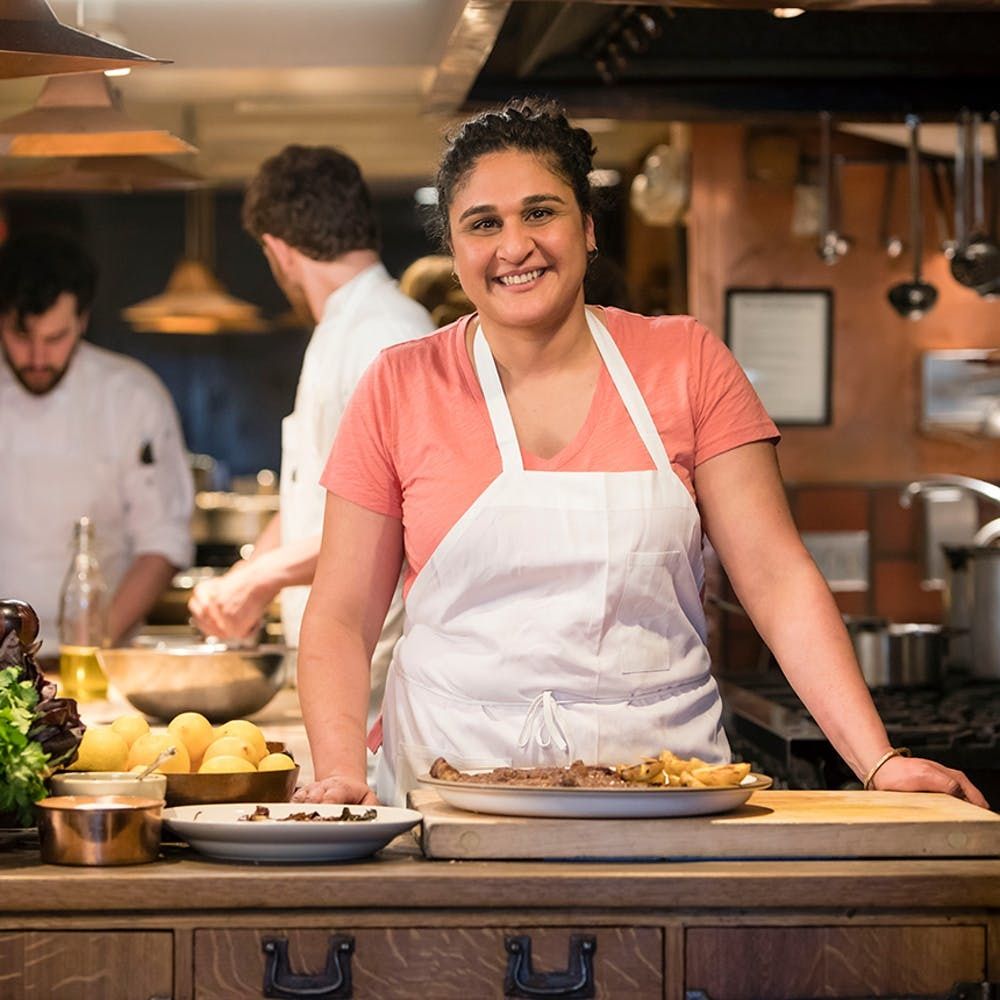Samin Nosrat’s Salt Fat Acid Heat dropped on Netflix recently, and after watching the docuseries, we totally get why our friends keep talking about it. On this four-part cooking travel show, Nosrat takes you on a journey through the picturesque countryside of Italy to the coasts of Japan to the colorful streets of Mexico and back to her home kitchen in Northern California.

Each destination and episode highlights one of the four key elements of cooking: salt, fat, acid, and heat. Nosrat says in the opening sequence the show, “Just four basic elements can make or break a dish… commit to mastering them and you can become not only a good cook but a great one.” Here are our favorite tips that have changed the way we cook and will inspire you to do the same.
Episode 1: Fat
1. Fat acts as a “spice” for food. “Fat is flavor. Fat is texture… Simply put, fat makes food delicious,” Nosrat expresses in the first episode. Like any spice, don’t let it overwhelm the other flavors. “Oil should never cover up the flavor of your dish, but it should accompany it and enhance it… the essential flavor of any dish starts with the fat it’s cooked in,” Nosrat breaks down on the show.
2. Replace your EVOO when it expires. Extra virgin olive oil is basically fresh pressed juice that is made without heat or chemicals. And this is why you should enjoy and use it as soon as possible. Olive oil isn’t like wine. It doesn’t get better with age. “In America, we don’t understand that oil is something fresh it has an expiration date. It’s not like wine — it can turn rancid,” Nosrat informs us.
3. Preheat the pan before adding oil. “Home cooks always forget is how important it is to preheat the pan. You have to heat the pan before [adding] the oil.” This opens the pores of the pan, allowing the oil to seep into the microscopic cracks, and thus create a nonstick surface. If you’re not sure if your pan is hot enough, she recommends testing it out by drizzling some water on it first. If the water sizzles away immediately, then your pan is hot and ready.
Episode 2: SALT
1. Watch out for salt size. Bigger salt crystals dissolve more slowly, so the saltiness will be gradual and less intense. Smaller ones quickly dissolve in your mouth, so you will taste all of its saltiness immediately. When cooking, you want to use large kosher salts for meats and finer salts for vegetables. Nosrat, who worked at the famous Berkeley restaurant Chez Panisse, reveals her favorite brand of salt is Diamond Crystal kosher salt because the flakes are light and easily dissolve into your food. However, if you’re using Morton’s kosher salt, one teaspoon equals two teaspoons of Diamond Crystal’s. And don’t forget a finishing salt for texture. Nosrat recommends Maldon, as this salt’s flakes will crunch on your tongue.
2. Salt your meat overnight. Nosrat stresses you should always salt your meat in advance and be careful to season all sides. Unwrap it, season it, wrap it back up, and put it in the fridge for at least an hour. She explains how the bigger the meat, the more time you need to let the salt do its work. “Ideally overnight, so the meat is not only more flavorful but also more tender,” she adds.
Episode 3: acid
1. Acid brightens food and creates contrast. “It does the absolutely necessary job of balancing flavor,” Nosrat argues. She goes on to describe how acid acts as a counterpoint AKA cuts through sweet, fatty, salty, and starchy food. For example, acidic cranberry sauce cuts through the rich casseroles and turkey on your Thanksgiving plate.
2. Marinate poultry but not too long. An acidic marinade will tenderize meats like chicken at first, but if the marinated meat is left in the fridge for too long (over a few hours), then it will toughen up like an overcooked steak. So plan accordingly to avoid that mistake.
3. There’s no substitute for fresh citrus. Use limes to master Mexican, Indian, or Vietnamese flavors and lemons for an all-purpose way to build acid into your food. When you’re picking out citrus, Nosrat says to press on the fruit to make sure there’s a little give. That way you’ll know there’s juice in there.
Episode 4: heat
1. Cook the full bird the right way. Whether roasting a full chicken or turkey, Nosrat says you should never take the poultry straight from the fridge into the oven. Allow the bird to come to room temperature (about an hour) before baking so the inner cavity will cook evenly with the exterior. Also, face the legs toward the back of the oven (the source of heat), because legs always need more time than the breast.
2. Stop overcrowding your sheet pan. Nosrat stresses that if you overcrowd the pan, there’s nowhere for steam to escape, and your food won’t properly cook. Make sure that all your vegetables are in contact with the pan and have sufficient space in between each piece. That way, the veggies can brown and caramelize.
What did you think of Salt Fat Acid Heat? Let us know on Twitter!
(Photos via Netflix)


